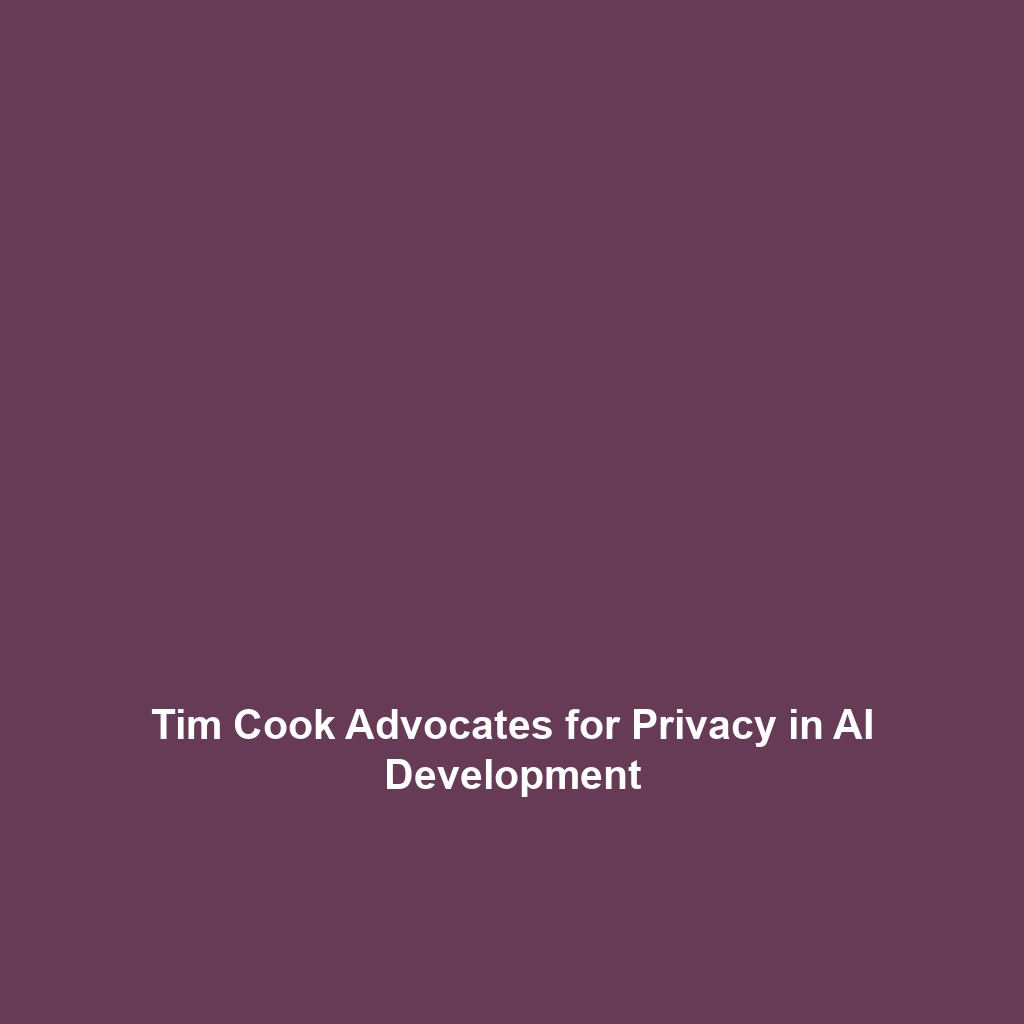Your cart is currently empty!
Tag: data protection

Tim Cook Advocates for Privacy in AI Development
Tim Cook Advocates for Privacy in AI Development
Tim Cook Advocates for Privacy in AI Development
Apple CEO Tim Cook has reaffirmed the company’s commitment to user privacy in the rapidly evolving field of artificial intelligence (AI). In a series of recent statements and initiatives, Cook has emphasized that privacy should be a fundamental principle in the development of AI technologies, placing Apple at the forefront of this critical conversation in the tech industry.
A Strong Call for Privacy
During a keynote address at a privacy conference, Cook articulated that “privacy is a fundamental human right” and expressed concern over how some companies handle user data. He noted the potential risks associated with AI when it comes to data collection and user surveillance. This statement aligns with Apple’s long-standing reputation for prioritizing user privacy over profit motives, contrasting markedly with other tech giants.
Cook’s advocacy is particularly pertinent given the rising scrutiny of AI technologies, which often rely on vast amounts of personal data to function effectively. “As we develop new AI tools, we must ensure that we are building them with privacy in mind from the ground up,” he remarked, reinforcing the idea that consumer trust is paramount for sustainable technological advancement.
Apple’s New Initiatives
In response to Cook’s call to action, Apple has launched several initiatives aimed at embedding privacy considerations into its AI tools. One key component of this effort is the introduction of on-device AI processing capabilities, which minimize the amount of personal data transferred to external servers.
According to recent articles from sources such as MacRumors, Apple is enhancing its machine learning frameworks to operate primarily on user devices, rather than in the cloud. This shift not only reduces the risk of data exposure but also aligns with user preferences regarding data privacy.
The Ethical Implications of AI
Cook’s emphasis on privacy as a guiding principle for AI development raises important ethical considerations within the technology sphere. Research from various institutions has highlighted the potential for AI to unintentionally perpetuate bias and invade user privacy. By advocating for privacy-first approaches, Apple could set a significant precedent for ethical AI practices.
Expert opinions from leading data ethicists support this viewpoint. Dr. Kate Crawford, a researcher at Microsoft Research, pointed out that “the principles of data stewardship must be at the core of AI development” to prevent misuse of sensitive information. By focusing on privacy, Cook’s initiatives may help mitigate the inherent risks linked to AI technologies.
Industry Response and Challenges
The tech industry has responded diversely to Cook’s initiatives. While some companies have praised Apple’s leadership in privacy, others express skepticism regarding the feasibility of implementing strict privacy measures without sacrificing innovation. Critics argue that a rigid framework may stifle creative developments in the field of AI.
In particular, competitors and analysts are monitoring how Apple’s commitment may affect its market positioning as AI continues to play an increasingly important role in consumer technology. Joshua Gans, an economist and author of “The AI Economy,” suggested that “the battle for talent in AI will increasingly factor in how companies handle user data,” implying that Apple’s focus on privacy could attract top talent looking for ethical employers.
Looking Ahead: The Future of AI and Privacy
As AI technology continues to evolve, the challenge of balancing innovation with privacy will undoubtedly remain at the forefront of discussions within the tech community. Tim Cook’s persistent focus on privacy is likely to encourage other companies to adopt more stringent measures regarding data protection and transparency.
The implications of these initiatives are significant not just for Apple, but for the broader tech landscape. Stakeholders, including consumers and regulatory bodies, are increasingly holding technology companies accountable for their data practices. As Cook noted, “The choices we make today will shape the society we create tomorrow,” highlighting the essential nature of responsible AI development.
Conclusion
In summary, Tim Cook’s advocacy for privacy in AI tools marks a pivotal moment in the ongoing discourse surrounding data protection. By integrating privacy considerations at every stage of AI development, Apple aims to set a new standard in the industry that prioritizes user trust and ethical practices. As the technology landscape continues to evolve, Apple’s initiatives may very well influence how other companies approach user privacy and AI in the coming years.
As the dialogue progresses, the focus remains on not just what AI can do, but how it can be developed responsibly and ethically. For further reading on this subject, refer to insights from MacRumors and other leading tech outlets.

